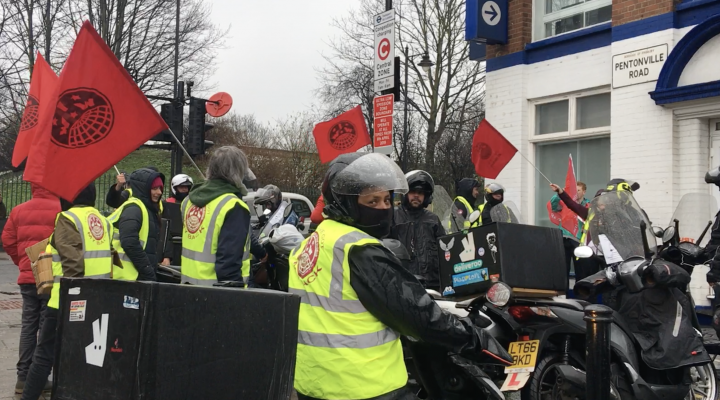A group of Deliveroo couriers joined in protest at the company’s offices in Islington.
The Industrial Workers of the World (IWW) arranged a strike this Friday morning which was attended by a group of about 30 Deliveroo riders. They met at Mydddleton Square Gardens, Clerkenwell, before moving to Pentoville Road, where Deliveroo’s offices are located.
The group gathered outside the building making noise with whistles, klaxons and megaphones, and intoning chants such as ‘Mr Boss, you must listen, we’ll shut down you algorithm’ and ‘five pounds a drop’. The couriers demand a minimum of £5 per delivery.
Deliveroo riders used to get paid an hourly rate, which varied depending on their area, plus £1 per drop. A new method was then introduced which allowed riders to get paid by delivery. The average payment per drop is around £4, but drivers claim that this amount has decreased in the past few months and also complain that the app’s algorithm is assigning them longer distances, which means they cannot make as many deliveries as they used to.
Rose Gomes, a Deliveroo courier from Brazil who was present at the protests, says that the new wages method has affected her working conditions. “I used to be able to work in my usual zone, the post code area WC1, but now I get given deliveries everywhere,” she explains. “Long distances for little money. The minimum payment [per delivery] used to be £4, but check this” —at this point Gomes unlocks her phone, opens a WhatsApp group which she shares with fellow Deliveroo riders from the area and selects a recent screenshot showing a payment of £3.79— “it’s not an easy job: a lot of working hours, sometimes even 12 hours, for little money.
It was through WhatsApp groups like the one Gomes is a member of that the word was spread: there was going to be a protest this Friday across several Islington locations and couriers were encouraged to attend. Tom Harrington, one of the IWW representatives who organised this strike, remarks the importance of WhatsApp groups for the community of riders, not only as it helps them to keep up to date but also because “it is a very lonely job”.
Besides the £5 minimum pay per delivery, the IWW is demanding £1 per extra mile, paid waiting times, right to appeal termination and the possibility to receive tips from customers, amongst several other conditions. Harrington believes their protests can make a difference: “We are after concrete results, we are not doing it for the fun of it. Pay has been going down for the past three months and before that it had always been unstable and unsteady, so we are after better conditions.”
Previous strikes may have already put pressure on the company: “The response we’ve got so far it’s only being implicit. They sent an email letting us know that they are working on some things. They didn’t say it was directly as a result of the protest but it obviously was,” says Harrington.
After hours of snowy and raining weather, another courier named Saul expressed his frustration: “It’s hard to even earn the minimum wage with this weather. Just look at the roads, we can’t work like this,” he lamented. But Deliveroo riders are not employed by the company. Technically they work for themselves, so they do not have any benefits such as paid holidays or pension.
The protest moved from the company’s offices to a supply center, which the riders blocked so no deliveries could come out. The kitchen workers inside the supply center solidarised with the Deliveroo couriers as they also started to make noise in form of protest. The riders then visited a Nando’s restaurant, one of the many chains that offers takeaway through Deliveroo.
Two other protests against Deliveroo took place on Tuesday in Bristol and Birmingham. Previous strike action has also taken place in other European cities such as Berlin, Brussels and Amsterdam. The latest major protest in London took place in 2016, when the new wages system was introduced. Riders marched with banners which read ‘Slaveroo’.

